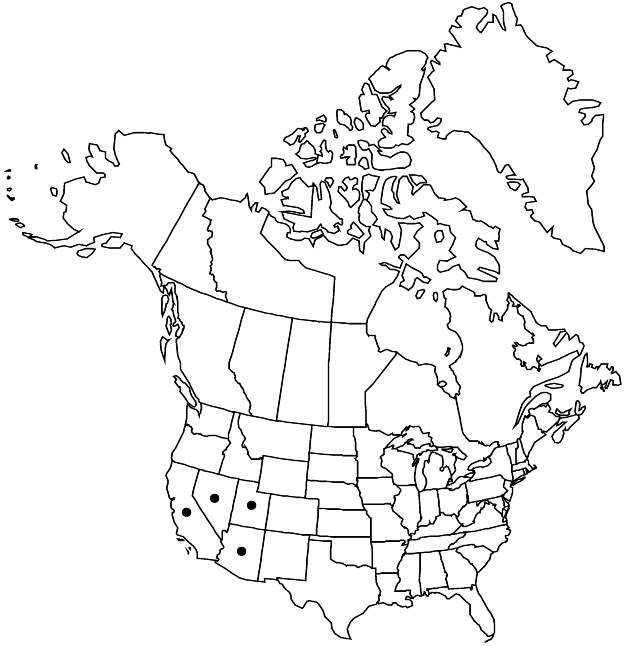Difference between revisions of "Eremogone macradenia"
Novosti Syst. Vyssh. Rast. 10: 140. 1973.
FNA>Volume Importer |
imported>Volume Importer |
||
| Line 8: | Line 8: | ||
}} | }} | ||
|common_names=Mohave sandwort | |common_names=Mohave sandwort | ||
| + | |special_status={{Treatment/ID/Special_status | ||
| + | |code=E | ||
| + | |label=Endemic | ||
| + | }} | ||
|basionyms={{Treatment/ID/Basionym | |basionyms={{Treatment/ID/Basionym | ||
|name=Arenaria macradenia | |name=Arenaria macradenia | ||
| Line 26: | Line 30: | ||
-->{{Treatment/Body | -->{{Treatment/Body | ||
| − | |distribution= | + | |distribution=Ariz.;Calif.;Nev.;Utah |
|discussion=<p>Varieties 2 (2 in the flora).</p><!-- | |discussion=<p>Varieties 2 (2 in the flora).</p><!-- | ||
--><p><i>Eremogone macradenia</i> is in the Center for Plant Conservation’s National Collection of Endangered Plants.</p> | --><p><i>Eremogone macradenia</i> is in the Center for Plant Conservation’s National Collection of Endangered Plants.</p> | ||
| Line 57: | Line 61: | ||
|basionyms=Arenaria macradenia | |basionyms=Arenaria macradenia | ||
|family=Caryophyllaceae | |family=Caryophyllaceae | ||
| − | |distribution= | + | |distribution=Ariz.;Calif.;Nev.;Utah |
|reference=None | |reference=None | ||
|publication title=Novosti Syst. Vyssh. Rast. | |publication title=Novosti Syst. Vyssh. Rast. | ||
|publication year=1973 | |publication year=1973 | ||
| − | |special status= | + | |special status=Endemic |
| − | |source xml=https:// | + | |source xml=https://bibilujan@bitbucket.org/aafc-mbb/fna-data-curation.git/src/bb6b7e3a7de7d3b7888a1ad48c7fd8f5c722d8d6/coarse_grained_fna_xml/V5/V5_144.xml |
|subfamily=Caryophyllaceae subfam. Alsinoideae | |subfamily=Caryophyllaceae subfam. Alsinoideae | ||
|genus=Eremogone | |genus=Eremogone | ||
Revision as of 23:31, 27 May 2020
Plants tufted, green, not glaucous, with woody base. Stems erect, (10–)20–40(–70) cm, glabrous to stipitate-glandular. Leaves: basal leaves sparse or absent; cauline leaves usually in 5–12+ pairs, not significantly reduced; basal blades ascending to arcuate-spreading or recurved, needlelike or narrowly linear, (0.7–)2–6(–7) cm × 0.8–2 mm, ± rigid, herbaceous to subsucculent, apex blunt to spinose, glabrous, not glaucous. Inflorescences 3–20(–30)-flowered, ± compact cymes; branches ascending to erect. Pedicels 3–45 mm, glabrous or stipitate-glandular. Flowers: sepals 1–3-veined, ovate to lanceolate or elliptic, 4.5–7.2 mm, to 8 mm in fruit, margins narrow to broad, apex acute to acuminate, glabrous to sparsely stipitate-glandular; petals white or yellowish, oblanceolate to spatulate, 6–11 mm, 1–2 times as long as sepals, apex entire or erose; nectaries thickened, molarlike, apically 2-lobed, 1–1.5 mm, or narrowly longitudinally rectangular, truncate, 0.7–0.8 mm, densely minutely pubescent with erect to spreading hairs. Capsules 6–8 mm, glabrous. Seeds greenish or reddish brown to blackish, suborbicular to pyriform or ovoid, 1.3–3.2 mm, tuberculate, sometimes echinate on abaxial ridge; tubercles low, rounded to conic.
Distribution

Ariz., Calif., Nev., Utah
Discussion
Varieties 2 (2 in the flora).
Eremogone macradenia is in the Center for Plant Conservation’s National Collection of Endangered Plants.
Selected References
None.
Key
| 1 | Cauline leaves mostly in 5-8 pairs, blade ± ascending throughout, 0.8-1.2 mm wide | Eremogone macradenia var. macradenia |
| 1 | Cauline leaves mostly in 6-12+ pairs, blade curved downward, especially proximal ones, 1.2-2 mm wide | Eremogone macradenia var. arcuifolia |